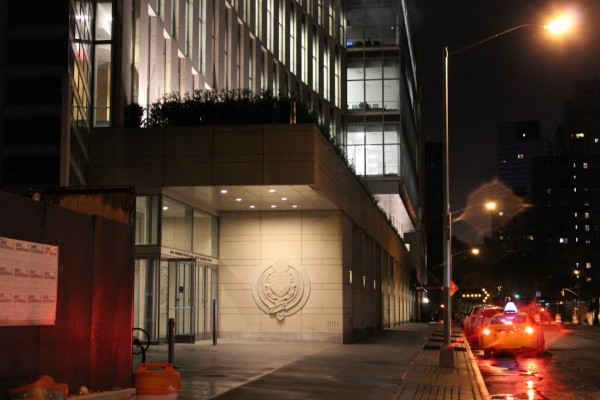Swastika Found in Bathroom at FCLC
November 12, 2015
Around noon today, President of the University Rev. Joseph McShane, S.J. sent a letter to the Fordham community stating that a “swastika and white supremacist reference were found on a bathroom dispenser in Lowenstein Center on the Lincoln Center campus.”
This is the sixth bias incident to occur on a Fordham campus since 2012. From February to March 2012, there were three: the first involved the n-word being graffitied on the dorm door of a black resident assistant at Fordham College at Lincoln Center (FCLC). Next, a homophobic word was found in the stairwell of the Lincoln Center campus. The third involved another racial slur found in a bathroom at the Rose Hill campus. The fourth was the carving of the n-word on a black student’s dorm door at the Rose Hill campus this September. Shortly after, the fifth incident was a backwards swastika scratched into a stairwell wall, in the Lalande Residence Hall.
He went on to state, “it is hard to overstate the perversion of someone who would casually embrace such a symbol.” McShane defined the swastika as a symbol that “stands for the deliberate destruction of six million Jews, and an ideology that launched the most destructive war in human history.”
According to the email, Public Safety is investigating the incident and the New York Police Department (NYPD) has been notified. McShane closed his email with: “Though hateful acts like last night’s are deeply upsetting, they do not define us as a community nor as individuals. We will continue to repudiate such actions whenever they occur, and rise above them.”
Below is McShane’s full address to the University:
November 12, 2015
Dear Members of the Fordham Family:
Last night a swastika and white supremacist reference were found on a bathroom dispenser in Lowenstein Center on the Lincoln Center campus. We may never know what was in the mind of its author, but it is hard to overstate the perversion of someone who would casually embrace such a symbol. In its modern form, the swastika stands for the deliberate destruction of six million Jews, and an ideology that launched the most destructive war in human history. The most hopeful explanation would be that the person who committed this act this has a profoundly limited understanding of what they have done.
I have been an educator and a priest longer than most of our students have been alive, and though I recognize that there will always be some small minority who choose to act out their rage and entitlement in acts like this, they never fail to shock and disappoint me. Regardless of its intent, such an act is a kind of terrorism, ensuring that its intended target—and indeed all people of good will—feel unsafe in their daily lives. Though Public Safety is already investigating, the NYPD has been notified, and the repugnant symbol was removed, the moral stain remains. Even if the perpetrator is identified and appropriately punished, the memory of the act lingers.
And that is a shame. The real commitment and nature of the University is contained in two high-profile events this month, and not in this vile incident: Tuesday, Father Patrick Ryan, SJ, delivered the fall McGinley Lecture, “Rejecting Hatred: Fifty Years of Catholic Dialogue with Jews and Muslims Since Nostra Aetate,” followed by a Jewish response by Magda Teter, PhD, Shvidler Chair in Judaic Studies at Fordham, and a Muslim response by Hussein Rashid, PhD, professor of religion at Hofstra University; and this coming Monday, Professor Teter will be installed as the Shvidler Chair in a ceremony at which she will deliver a lecture, “Alienation to Integration: Rethinking Jewish History,” in part about the necessity of preserving knowledge. Ironically both events are in Lowenstein Center, where the swastika was found.
Both Father Ryan’s McGinley Lecture and Dr. Tater’s inauguration symbolize the University’s commitment to mutual understanding and dialogue, and to the universal human connection. We are at our best when we are not separated by race, religion, gender, or sexual identity. All universities face challenges in creating and sustaining communities marked by mutual respect, affirmation, and affection, but our Jesuit, Catholic roots call us to be better. We are at our strongest when we meet bigotry by defending and embracing its victims. Though hateful acts like last night’s are deeply upsetting, they do not define us as a community nor as individuals. We will continue to repudiate such actions whenever they occur, and rise above them.
Joseph M. McShane, SJ










